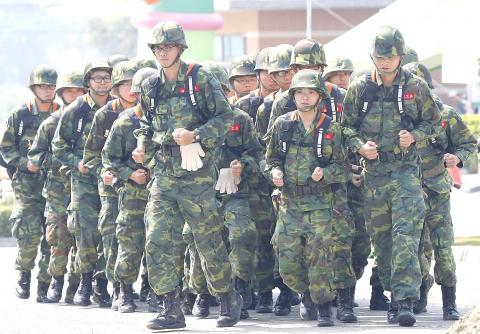The implementation date for an all-volunteer military has been pushed back two years from 2015 to 2017 because of recruitment difficulties, the Ministry of National Defense announced yesterday at a press conference.
The military was scheduled to shift to an all-volunteer force by the end of next year. However, the ministry has experienced difficulties recruiting sufficient volunteers in the past 20 months since the Executive Yuan approved the plan last year and has been forced to defer implementation.
The Executive Yuan has approved the ministry’s revised plan, which would men born before Dec. 31, 1993, to serve a one-year mandatory military service, with those born after Jan. 1, 1994 receiving a four-month basic military training, Ministry of National Defense spokesman Major-General David Lo (羅紹和) said.

Photo: CNA
Those who were born before Dec. 31, 1993, had only been required for substitute services, but now are needed to fill the personnel shortage.
An all-volunteer military has been one of President Ma Ying-jeou’s (馬英九) most important campaign pledges.
The ministry had planned to cut the size of the military from 235,000 to 215,000, of which 176,000 would be volunteers, by 2015.
The ministry was concerned that the nation’s armed forces would not be sufficiently strong to carry out their duties of safeguarding the nation and disaster relief if volunteer recruitment continued to fall short of the original goal.
Its recruitment has been further hampered by the case of army corporal Hung Chung-chiu (洪仲丘), who died following alleged abuse at a military detention facility in July, triggering a protest by about 250,000 people last month demanding reform of the military.
Wang Tien-de (王天德), director of the ministry’s Department of Resources Planning, estimated that 60,000 draftees would be affected.
Wang denied that plans to create an all-volunteer military had failed, reiterating that the ministry is still working toward reaching that goal.
Draftees born before Dec. 31, 1993, could still apply for alternative non-military community service, but they could have to go through a draw, said Tsai Ching-chih (蔡清治), director of Draft Division of the National Conscription Agency.
The ministry said it believed benefits and welfare for military personnel would have to be increased to provide extra incentive for those who are interested in a military career.
Democratic Progressive Party lawmakers have criticized Ma for violating his campaign pledge, with Legislator Wu Ping-jui (吳秉叡) saying that Ma’s poor leadership as commander-in-chief was why the military had become notorious for its low morale and mismanagement, which had subsequently resulted in recruitment problems.
Chinese Nationalist Party (KMT) Legislator Lin Yu-fang (林郁方) said that deferring the implementation date for an all-volunteer military would only be a temporary remedy to address personnel shortages.
“In the long run the ministry will still have to find a solution [to the lack of recruits], otherwise the problem will resurface in two years’ time,” Lin said.

People can preregister to receive their NT$10,000 (US$325) cash distributed from the central government on Nov. 5 after President William Lai (賴清德) yesterday signed the Special Budget for Strengthening Economic, Social and National Security Resilience, the Executive Yuan told a news conference last night. The special budget, passed by the Legislative Yuan on Friday last week with a cash handout budget of NT$236 billion, was officially submitted to the Executive Yuan and the Presidential Office yesterday afternoon. People can register through the official Web site at https://10000.gov.tw to have the funds deposited into their bank accounts, withdraw the funds at automated teller

PEACE AND STABILITY: Maintaining the cross-strait ‘status quo’ has long been the government’s position, the Ministry of Foreign Affairs said Taiwan is committed to maintaining the cross-strait “status quo” and seeks no escalation of tensions, the Ministry of Foreign Affairs (MOFA) said yesterday, rebutting a Time magazine opinion piece that described President William Lai (賴清德) as a “reckless leader.” The article, titled “The US Must Beware of Taiwan’s Reckless Leader,” was written by Lyle Goldstein, director of the Asia Program at the Washington-based Defense Priorities think tank. Goldstein wrote that Taiwan is “the world’s most dangerous flashpoint” amid ongoing conflicts in the Middle East and Russia’s invasion of Ukraine. He said that the situation in the Taiwan Strait has become less stable

Japanese Prime Minister Sanae Takaichi yesterday lavished US President Donald Trump with praise and vows of a “golden age” of ties on his visit to Tokyo, before inking a deal with Washington aimed at securing critical minerals. Takaichi — Japan’s first female prime minister — pulled out all the stops for Trump in her opening test on the international stage and even announced that she would nominate him for a Nobel Peace Prize, the White House said. Trump has become increasingly focused on the Nobel since his return to power in January and claims to have ended several conflicts around the world,

REASSURANCE: The US said Taiwan’s interests would not be harmed during the talk and that it remains steadfast in its support for the nation, the foreign minister said US President Donald Trump on Friday said he would bring up Taiwan with Chinese President Xi Jinping (習近平) during a meeting on the sidelines of the APEC Summit in South Korea this week. “I will be talking about Taiwan [with Xi],” Trump told reporters before he departed for his trip to Asia, adding that he had “a lot of respect for Taiwan.” “We have a lot to talk about with President Xi, and he has a lot to talk about with us. I think we’ll have a good meeting,” Trump said. Taiwan has long been a contentious issue between the US and China.